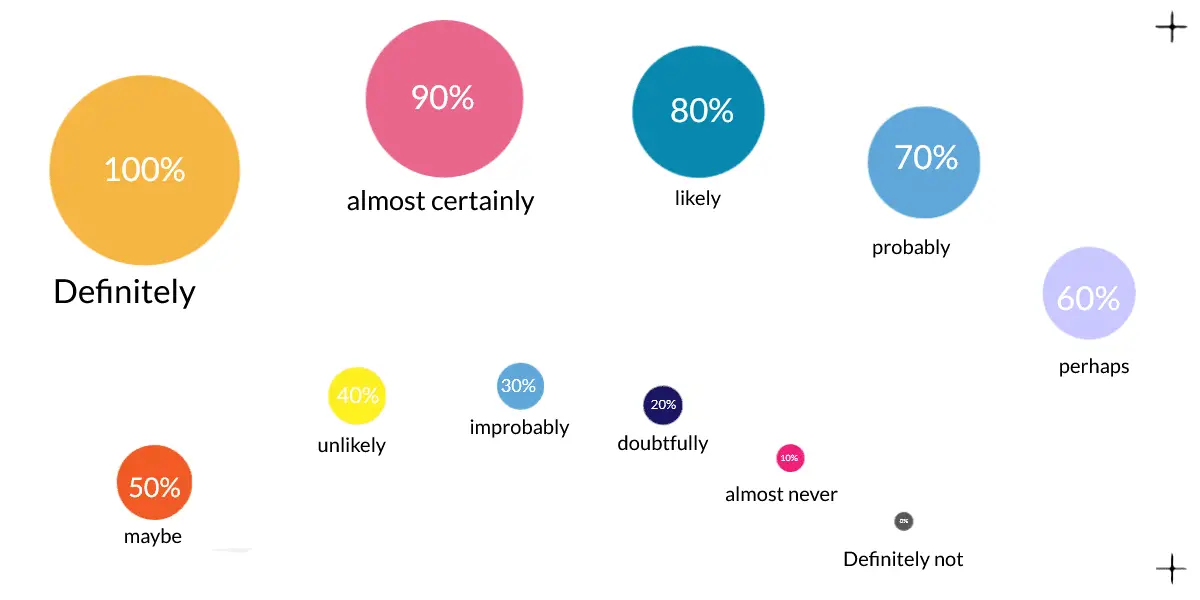When discussing the likelihood of an event occurring, English speakers use various words and phrases to express certainty, uncertainty, and possibility. Understanding these probability expressions not only helps in better communication but also enhances comprehension of spoken and written English.
In this comprehensive guide, we’ll explore how to express probability effectively and use it in different contexts.
Understanding the Probability Scale
Probability expressions range from absolute certainty (100%) to complete impossibility (0%). The words and phrases used convey different levels of likelihood.
1. High Probability (70% – 100%)
These expressions indicate that an event is very likely to occur:
- 100% – Definitely → “I will definitely be there on time.” (Absolute certainty)
- 90% – Almost certainly → “She is almost certainly going to win the award.” (Very high probability)
- 80% – Likely → “It’s likely that we’ll see rain this afternoon.” (High probability but not guaranteed)
- 70% – Probably → “They will probably arrive by noon.” (A strong possibility but with some uncertainty)
Usage Tips:
- Use these expressions when discussing facts, strong assumptions, or planned events.
- They are common in news reports, weather forecasts, and professional communication.
2. Medium Probability (50% – 60%)
These words indicate that an event is equally likely or unlikely to happen:
- 60% – Perhaps → “Perhaps we can meet for coffee later.” (Moderate probability, but not certain)
- 50% – May be → “He may be running late.” (A neutral expression where chances are equal)
Usage Tips:
- Use these words when you are uncertain about an event but see a reasonable possibility.
- Often used in speculative discussions, negotiations, and casual conversations.
3. Low Probability (10% – 40%)
These phrases suggest that an event is unlikely but still possible:
- 40% – Unlikely → “It’s unlikely that she’ll change her mind.” (Some possibility, but low confidence)
- 30% – Improbably → “He will improbably agree to such a big risk.” (A rare occurrence but not impossible)
- 20% – Doubtfully → “She doubtfully remembers what happened.” (Low confidence in something happening or being true)
- 10% – Almost never → “I almost never drink soda.” (A very rare or uncommon event)
Usage Tips:
- These words are often used to set expectations or express skepticism.
- They appear in debates, forecasts, and opinions on uncertain topics.
4. No Probability (0%)
For events that are impossible or completely ruled out:
- 0% – Definitely not → “They are definitely not coming to the party.” (Absolute impossibility)
Usage Tips:
- Use these expressions when negating an idea completely.
- Often found in firm denials, rules, and strong opinions.
Using Probability in Different Contexts
1. Predictions and Forecasts
- “It will probably snow tomorrow.” (Weather forecasting)
- “The stock market is likely to recover next month.” (Financial predictions)
2. Expressing Doubt or Certainty
- “I doubt she will accept the job offer.” (Low probability)
- “She is almost certainly getting a raise this year.” (High probability)
3. Decision-Making and Advice
- “You may be better off waiting before making a decision.” (Medium probability)
- “It’s unlikely that this plan will work without adjustments.” (Low probability)
4. Planning and Future Events
- “He is definitely coming to the meeting tomorrow.” (100% certainty)
- “Perhaps we’ll go on a vacation next summer.” (Moderate uncertainty)
Common Mistakes and How to Avoid Them
1. Confusing ‘Probably’ and ‘Possibly’
- “She will probably come” (High likelihood, 70% or more)
- “She will possibly come” (Much lower likelihood, around 50%)
Solution: Use ‘probably’ for stronger confidence and ‘possibly’ for neutral situations.
2. Overusing ‘Maybe’ in Formal Writing
‘Maybe’ is often too informal for business or academic writing. Instead, use:
- “It is likely that…”
- “There is a strong possibility that…”
3. Misusing ‘Could’ and ‘Would’
- “It could rain tomorrow.” (A possibility, but uncertain)
- “It would rain tomorrow if the temperature dropped.” (Conditional statement)
Solution: Use ‘could’ for possibilities and ‘would’ for hypothetical scenarios.
Why Mastering Probability Expressions is Important
- Enhances your ability to communicate clearly.
- Helps in making more informed decisions.
- Avoids misunderstandings in both personal and professional conversations.
- Improves fluency and naturalness in spoken English.
Final Thoughts
Mastering probability expressions will greatly improve your ability to express certainty, uncertainty, and likelihood in conversations. Whether you’re making plans, giving advice, or discussing possibilities, these words will help you communicate with precision and clarity.
Try using these expressions in your daily conversations and see how they enhance your fluency!

